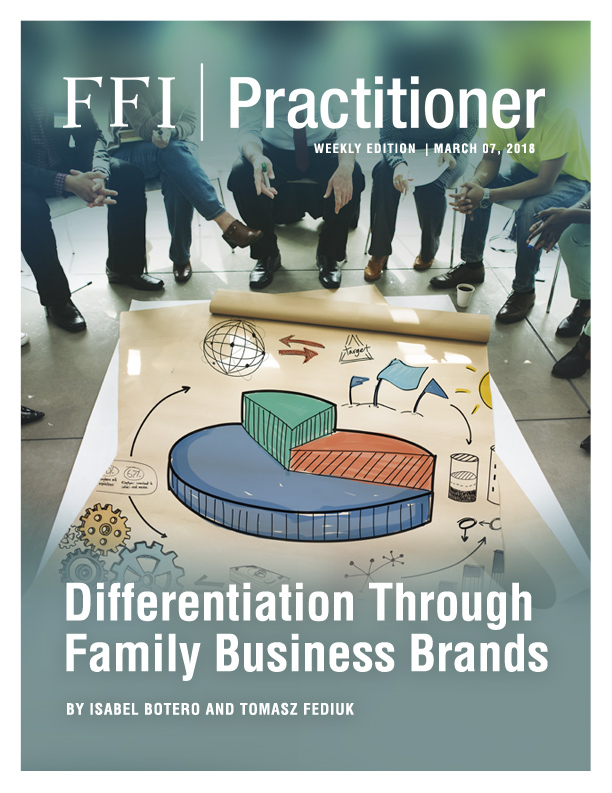Resources
Differentiation Through Family Business Brands
Weekly Edition • March 07, 2018

From FFI Practitioner
Many family businesses are confronted with the question of whether their corporate branding should highlight the family’s involvement in the business. In this week’s FFI Practitioner, Isabel Botero and Tomasz Fediuk explore both sides of this issue and share three central aspects of family business branding.
Differentiation is essential in today’s very competitive business environment. Organizations need to find ways to stay “on top” of consumers’ minds and be able to differentiate from other companies.
One of the ways businesses achieve differentiation is through branding. In its most general sense, brands represent a mark, symbol, or association that enables individuals to differentiate between products or companies that may offer similar products. Brands initiate associations and promises about a product or service (for example, luxury, performance, safety, quality, prestige, low cost, etc.).
Family business scholars and practitioners have become increasingly interested in understanding whether branding the involvement of the family in the business can create unique differentiating associations. The branding of family involvement is often complementary to the services or products that a company offers. For example, in the wine industry, it is common to promote the wine and also to connect the wine with the family and its dedication to quality and passion in wine making. Thus, the family business brand is used to enhance the product brand. Family business branding may benefit a company by initiating additional associations such as tradition, longevity, trustworthiness and a human connection to a product or service.
“Family business scholars and practitioners have become increasingly interested in understanding whether branding the involvement of the family in the business can create unique differentiating associations.”
The 2017 version of the Edelman Trust Barometer– special report on family businesses – found that 75% of the sample (i.e., 15,000 people from 12 markets) were more likely to trust family businesses over non-family businesses, and 66% of them were willing to pay more for products/services offered by family firms. Thus, family firms are in a unique position to leverage their family business brands as a source of differentiation.
As advisers helping our clients, we need to understand three central aspects of family business brands:
- How do family business brands work?
Family business branding messages are designed to highlight the overlap between the business and family ownership in an attempt to create positive associations. Too often, branding begins and ends with the creative visual elements of graphic design. While this is critical in the process, we need to consider all aspects of the strategic branding process. Ultimately, branding is relevant to the degree that we get positive effects from the symbols and narratives created in the branding process.
Sidebar

Edelman has been studying trust for the past 17 years. Over this time, we have seen a decline in trust across the institutions of business, government, NGOs and media.
It is important to emphasize that messaging is not limited to the controlled narratives created for marketing efforts. Audiences also are exposed to the behaviors of family members (through actual experiences, stories from others, or the media). When choosing to use the family brand, any family member’s words and deeds can be used to interpret the alignment between the messaging and the associations created in the audience’s minds (even if the family member is not working in the family business).
- What associations do family business brands create in the mind of consumers?
Branding is about creating mental associations. These associations are seen as promises from the family regarding its products or services. The perceived promises set expectations that will be used when interacting with the family business. When expectations are met or positively surpassed, the family business brand becomes a source of competitive advantage. However, any inconsistencies between perceived promises and the actual experiences can lead to dissatisfaction, negative outcomes and crisis. This is independent of whether the brand promise was intended or not (as the promise is formed in the mind of the stakeholder). Thus, we need to critically assess and monitor how people interpret and experience branding efforts. See the figure below.

- How does communicating the family business brand impact the family?
In a recent paper published with Claudia Binz Astrachan, we find that business owners are quite strategic in their choice to use the family business brand. Given that promoting a family business brand has the potential of making the family more visible, business owners comment on the importance of considering the effects that this added visibility could have for the family, and how the family might react to becoming a public persona.
Some families choose the privacy of family over the benefits that may come to business branding efforts. A heightened visibility factor can make a family more newsworthy, which can lead to both positive and negative publicity (family scandal stories of high profile families are of great interest to the media). Thus, it is important to understand the additional implications that the use of the family business brand can bring.
When talking about family business brands, many marketing experts suggest that “if you have it, you should flaunt it.” However, the raised profile may also expose the family to risks that are not acceptable to the family. While branding does offer differentiation benefits, families need to consider the risks and rewards of using family business branding for their business. The decision to engage in family business branding is a strategic decision. Advisers need to be able to guide the family through the options and implications of making the family aspects of the business more visible.

About the contributors
Isabel C. Botero is an assistant professor in the Department of Management and a researcher at the Family Enterprise Center at Stetson University. She is the treasurer and a board member of the International Family Enterprise Research Academy, and an associate editor for the Journal of Family Business Strategy. Isabel obtained her PhD from Michigan State University. Her areas of specialty include strategic communication processes, philanthropy in family firms, and next generation issues in family enterprises. She can be reached at ibotero@stetson.edu.

Tomasz A. Fediuk is managing director at Fediuk Botero, LLC, a research and advisory firm for family enterprises. He is also a co-founder and contributor to Impact Capitalist, whose mission is to inspire and provide resources for business owners and entrepreneurs as they use their businesses to make a positive impact in the lives of others. Tom received his PhD in communication from Michigan State University. He can be reached at tafediuk@fedtero.com.
About Stetson University Family Enterprise Center
Stetson University created the Family Enterprise Center in 1998. The purpose was, and continues to be, to help next generation and family members understand and navigate the challenges of family ownership. The Center strives to have an impact on the sustainability of family run enterprises at the local, national and international level. The Stetson University School of Business Administration and the Family Enterprise Center will be hosting a half-day seminar exploring brand management for the family enterprise titled, “Branding the Family Enterprise: Does It Work, or Does It Hurt?”
The seminar will take place on Wednesday, March 28 from 1pm – 4pm at Rinker Auditorium in DeLand, Florida.
Sneak Peek


